General
Ambassador Arikana Chihombori tasks African Youth Leaders to re-unite Africa
Published
2 years agoon
By
Mak Editor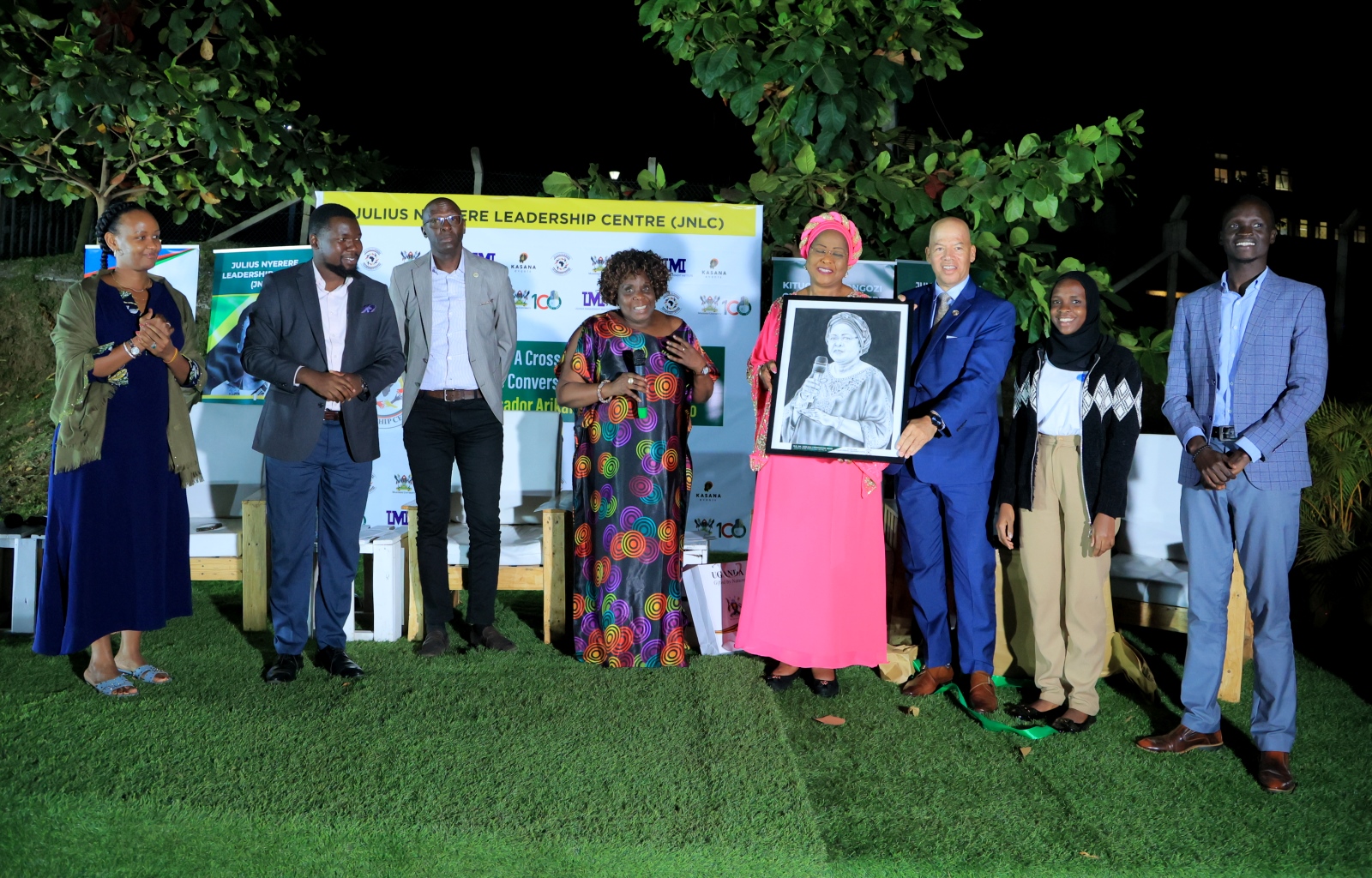
By Ritah Namisango
“We are at war-an economic war; we are also at war with our own mind. Wake up Africa, have a conversation with the image in the mirror and what you believe. We have to continuously and constantly remind ourselves that we have this ailment and we were programmed to feel inferior. That is the part of mind and a continuous battle. You and the image in the mirror are the only ones who can decide whether it is a battle that you are determined to win,” H.E Ambassador Dr. Arikana Chihombori Quao tasked the youth and student leaders at a cross-generational Fireside Conversation (Ekyooto) organized by Julius Nyerere Leadership Centre (JNLC) at Makerere University on July 26th 2023.
The Julius Nyerere Leadership Centre (JNLC) is named after a great Pan-Africanist and former President of the United Republic of Tanzania, the late Mwalimu Julius Kambarage Nyerere. The Centre, established as a Presidential Initiative, was launched on October 6th 2018 to honor his legacy as a true African leader and activist. The Centre was expected to spearhead intergenerational dialogues on African history and the study of Africa’s revolutionary movements. As a knowledge and research hub, the Centre was to provide a platform for distinguished African intellectuals, scholars and other accomplished Africans to share, nurture, mentor, challenge and account to the next generation of African leaders.
Delivering the keynote speech, H.E. Ambassador Dr. Arikana Chihombori-Quao reflected on the past ideas and current leaders’ ideals to build Africa’s self-sustenance. While sharing with the vibrant young minds at ‘Ekyooto’ about the gift of the African Continent, the Ambassador emphasised the need to go back to the genesis and root of why Africa is where it is today. In her view, we can never know where we are going if we don’t know where we come from.
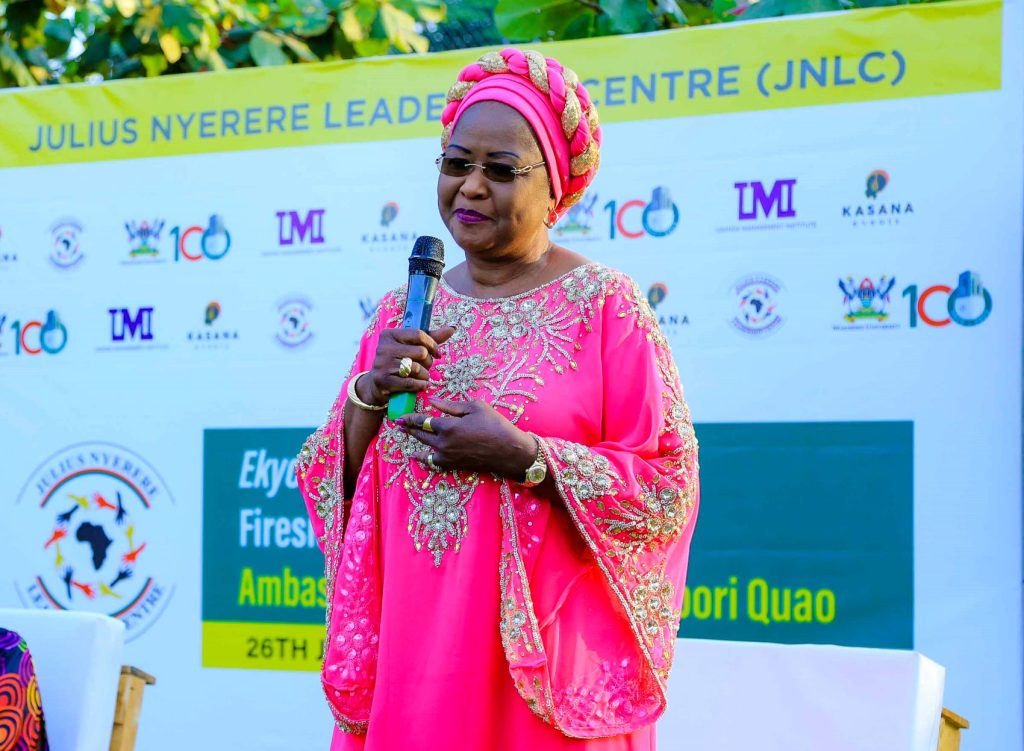
H.E Ambassador Dr. Arikana Chihombori Quao is a medical doctor, public speaker, educator, an entrepreneur and a staunch Pan African Activist who originates from Chivu, Zimbabwe, but based in the United States of America (USA). She served as the African Union representative to the United States of America (USA), 2017-2019.
“Brothers and sisters, let us try to understand that Africa is a tree of life. It reminds me about how this great African continent was and is the mother of humanity and life. Let us have a deep understanding of the issues of the root and not waste time to only understand the issues above the ground. Much as they matter too, the most fundamental issue is to understand the matters of the root on this African tree of life, because if we don’t, we will continue to fight about the issues above the ground of this African tree of life,” said the Ambassador.
Ambassador Arikana expressed the need for Africans to understand the root cause of Africa’s ailment, which would put the continent in a better position to strategise and push back against the Western and now the Eastern worlds which have systematically strategised to keep Africa in a position that leaves it prone to further exploitation.
“The question is, what happened to this beautiful, once vibrant African tree of life? We have to get back to the time when we were invaded by the West. They came and found an amazing continent and took away whatever they could. They wondered about how on earth they could conquer such a people. So, they decided to put in place certain fundamental root causes of African destruction. According to Dr. Arikana, they are the same people who set up the stage on how to destroy us systematically.”
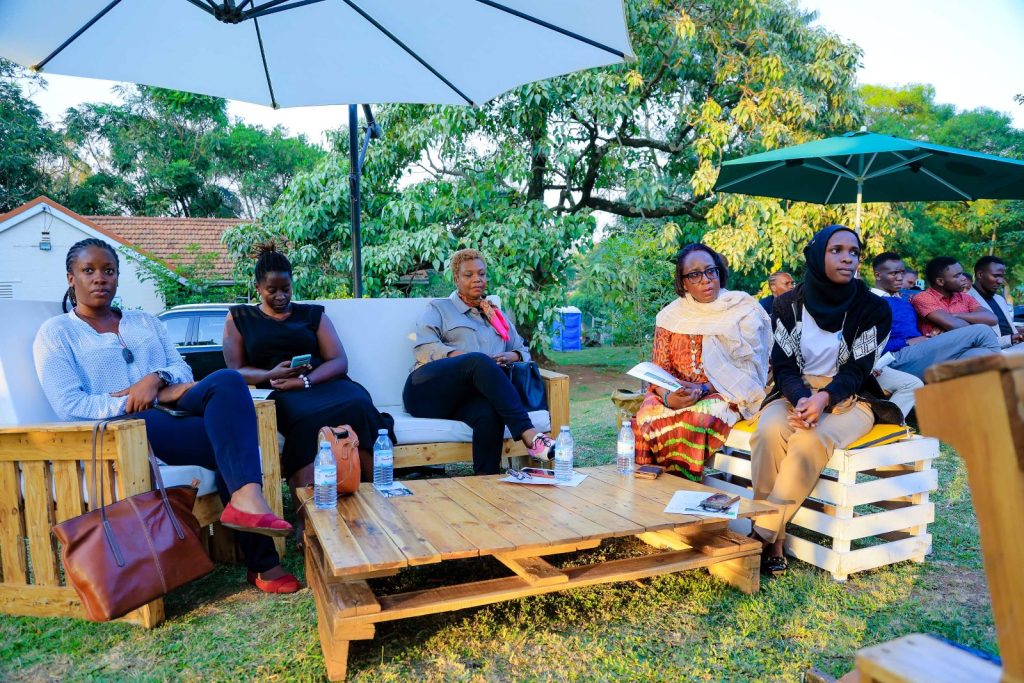
Describing how the West strategised to destroy and conquer Africa, she mentioned six (6) strategies that included religion, colonization, slavery, foreign aid, trade policy and multinationals. She revealed that the six (6) strategies were used to brainwash Africans, capture their minds and to make them feel inferior, in addition to dissolving the African culture. “When the missionaries come to Africa, they had a mission to brainwash Africans. They were instructed to teach the Africans how to read, but not to reason. They were trained to systematically abuse and mistreat Africans in a way that could easily lead them into submission. They used religion to brainwash us,” she explained.
Talking about the mindset, the Ambassador explained that Whites used slavery as a destructive tool and trained slave owners to use the slaves’ bodies to control their minds. She said that once you mistreat the body, the mind is affected and once you control the minds, you put them on an automatic pathway to self-destruction. She added that these days, Africans continue to suffer due to the legacy of colonialism. Most of them believe that they cannot perform as those who don’t look like them. This makes Africans to feel inferior, a belief and practice that has been going on for centuries. Ambassador Arikana disclosed that Whites and colonialists defeated us with our own minds, adding that Africans should remember that the battle for us to gain our economic liberation starts with the mind.
She pointed out that the battle for true liberation must go on and for that to happen, the Africans especially the youth must be empowered with knowledge, facts and the truth. She advocated for serious conversations with the image in the mirror and begin to understand that we feel the way we do because we were systematically put in that position. The Ambassador stressed that we all have the responsibility to recreate and rebuild Africa to where it once was when we ruled the world. This is a warfare that the entire African community should embrace.
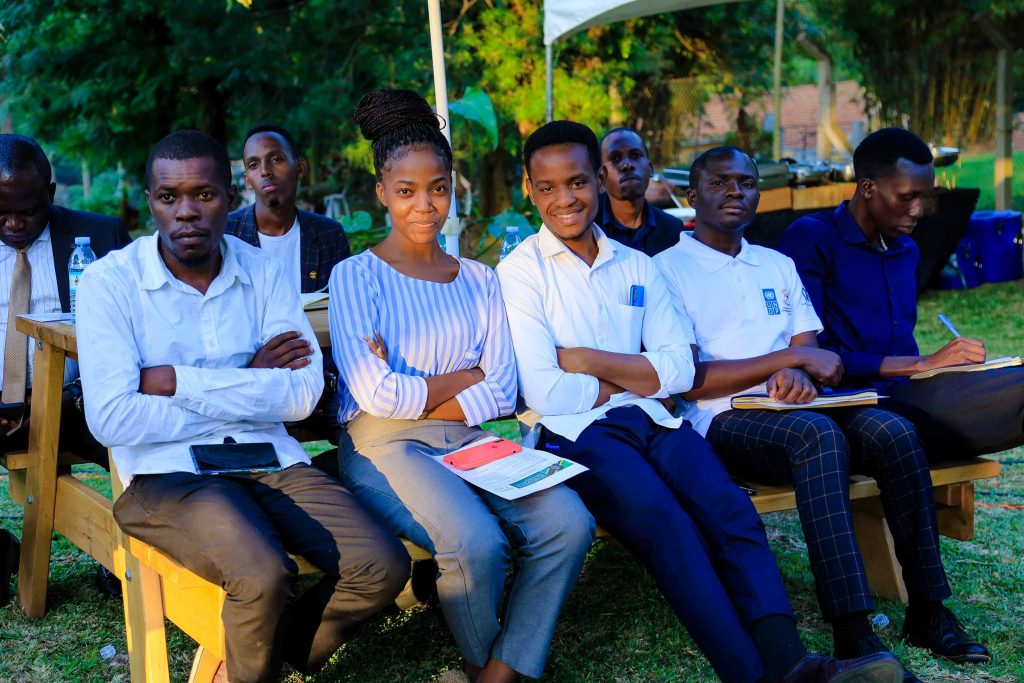
She reiterated that no one should ever tell us that we are not good enough. No one should let us feel inferior because we are the mothers and fathers of humanity. It is a fact that without the black man and woman, there would be no life and humanity. She stated that the Whites also realised that the gene for blackness is the only dominant gene, a finding that scared them the most.
“So, their fear of a black man and woman is real which proves that we are indestructible. Once we know all these facts, we shall never feel inferior. In fact, we should be standing tall and proclaim to the world who we are; the proud, beautiful, intelligent, sophisticated, highly adaptable and above all, totally indestructible,” the Ambassador firmly stated.
Ambassador Arikana spoke about the implications of the Berlin Conference that took place in Berlin, Germany, in 1884 on the African continent. She lectured about the outcome of the divisions on the continent of Africa that left many families, communities and kingdoms separated. She disclosed that these divisions explain the causes of some of Africa’s problems that are still in effect today. She then advocated for the reunification of Africa.
Sharing experiences and historical facts, Mr. Damian Courtland Cook, the Vice to the Ambassador, pointed out that the Whites used slavery to control Africans with a program they used to manipulate the mindset of young Africans. He disclosed to the student leaders and African youth at the Fireside Conversation (Ekyooto) that the Whites conducted a program within the plantations. “When new slaves would arrive at the plantation, they would take the strongest black man, tie him up and put him between two horses. They would take the females and line them up, preferably the pregnant ones or ones with young children. They would then rip this man apart to psychologically create a disturbing program in the mind of a child, they would then take all the men there and beat them half to death. These acts caused the mother to keep the child from becoming a dominant child and that was the intention of the program.”
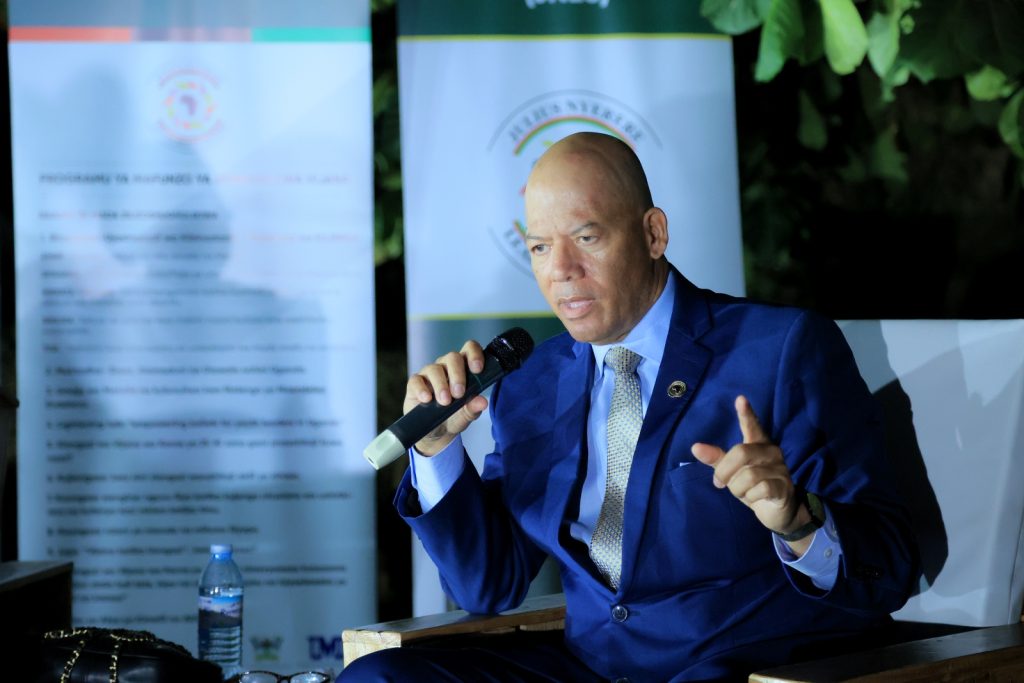
Having stayed in Africa especially in Zimbabwe, Mr. Damian Cook has known and seen the beauty of this great continent of Africa. He wondered why the West chose to portray a wrong image of Africa and whether they should still be called White. He said, “The image that Whites shed about Africa is not real, what is being given by the media is so different from the truth. The stories that were supposed to be told were not told to us about Africa, and the truth was never said. We only received images of young Africans found dirty and wandering around with flies, asking for donations. What was troubling was that the person asking for donations for these African children was a white person! If we say white, in our instincts we think of something pure, which is not the case here.”
Mr. Cook added that we have the brains and we should focus on bridging the technology gap for us to unite this continent. He said that the program is running in us, therefore, we must first recognize that there is a problem, and once we do so, then we must monitor it. He also advocated for the love and trust for each other.
“Why do we not trust one another? Why do we not trust our brothers and sisters, why do we not love each other, why are we so divided? We were programmed that way, it’s a program which is like a computer program. When it runs, it won’t stop unless you are aware of it, it will run, move you and you will think that it is your own fault. Mr. Cook said that these are thoughts that were planted in Africans.”
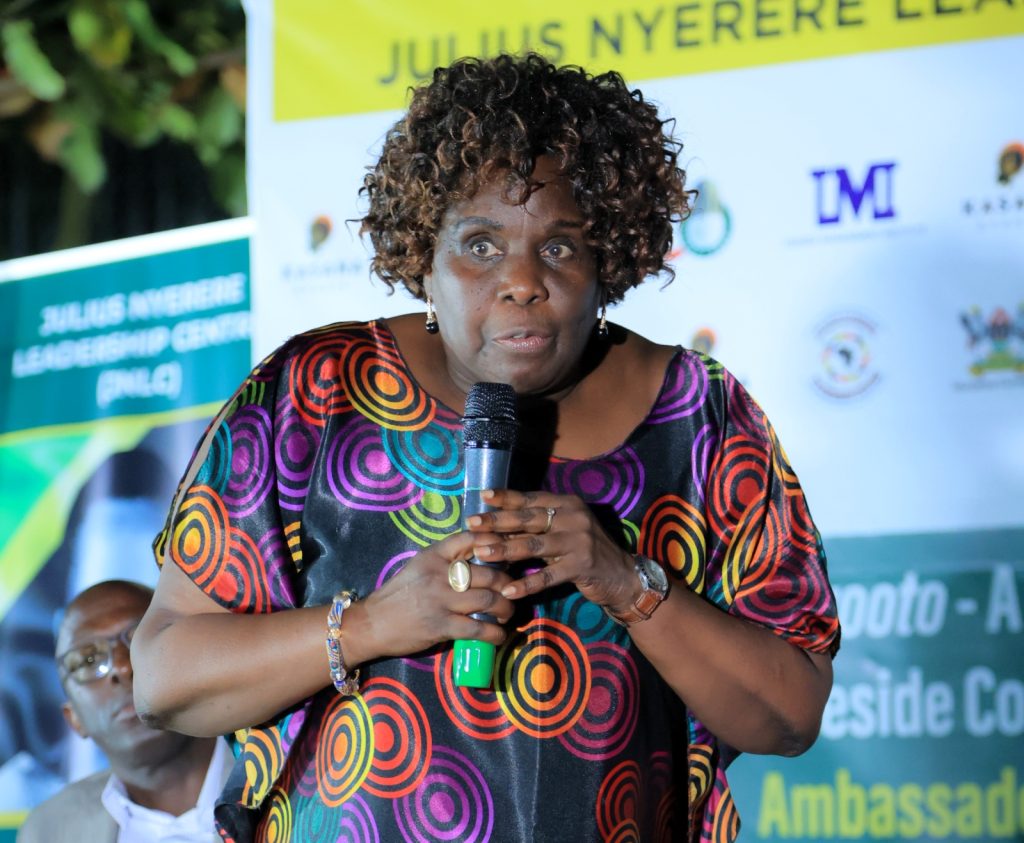
In her remarks, Dr. Suzie Nansozi Muwanga, the Executive Director, JNLC revealed that the Fireside conversations (Ekyooto) will be a great tool to bring together young and old people. Most importantly, the fireside conversations will awaken the minds of the youth to work on the image in the mirror. She advised the youth about the importance of self-discipline, the ability to hold themselves accountable and to always look out for their sister or brother to protect each other’s interests.
The Executive Director stated that “the mindset needs personal commitment. If you can commit yourself as a youth, a leader and an elder and always question and hold yourself accountable, there is no way you can go wrong, especially when you wrap it up with good discipline. All these happen to be in our good cultural norms of Africa,”
Professor Sarah Ssali, an Associate Professor at Makerere University and Dean-School of Women and Gender Studies and JNLC Board Member emphasised the need for Africans to play a part in the definition and re-definition of the narratives about Africa. She said that they have a role to play and the Julius Nyerere Leadership Centre (JNLC) provides a place and space they could sit and have these conversations, about what it means for us to be located on the continent at this particular time in history.
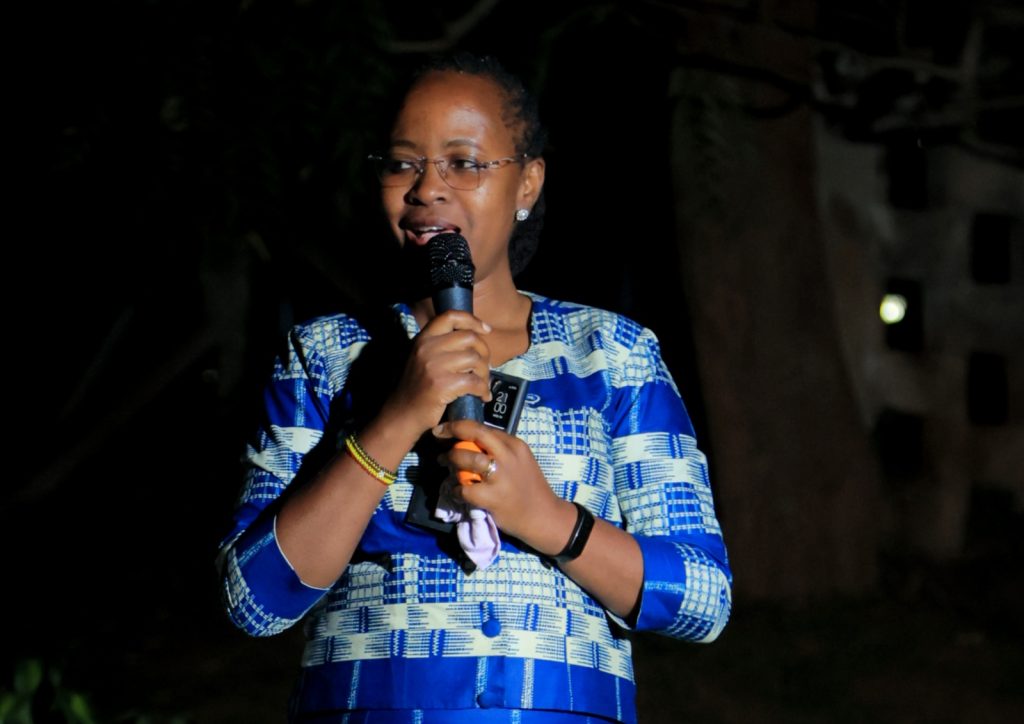
Associate Professor Sarah Ssali said “this is a time when we cannot afford to be complaisant, it is a time when we cannot afford to ignore and leave the definition and narratives to others. We are very happy that the JNLC came up with leadership and presidential leadership series.”
Associate Professor Sarah Ssali reiterated the fact that Africa is in an economic war and war of the mind that call for immediate action. She called upon the young and future leaders to stay focused.
She remarked that “much as there is a mind war that we experience individually, there is also a structural plan which shapes and determines what we experience as individuals. As we contemplate, the image in the mirror should not be forgotten.”
In addition, Mrs. Esteri Akandwanaho Muhoozi, a JNLC Board Member emphasised the need for Africans to understand their history and called upon the present generation to write the past roles and make better choices for a united and better sustaining African continent.
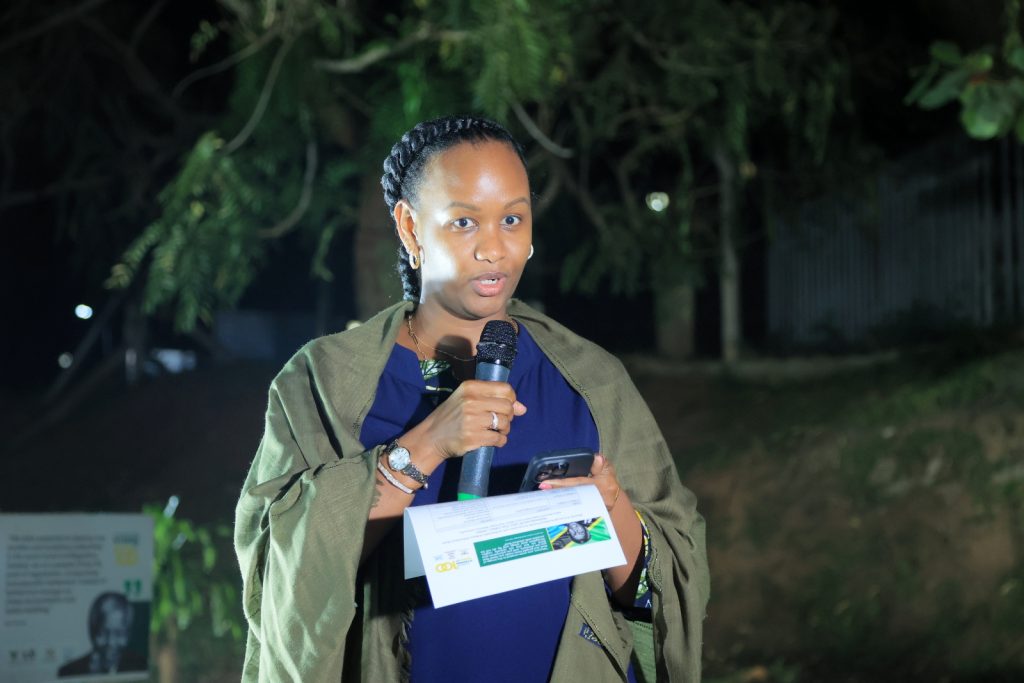
“Let us draw on the lessons learned here and those from our past leaders namely Mwalimu Julius Nyerere and we remain resolute in our commitment to make better choices for our continent and families,” she said. Mrs. Esteri Muhoozi noted that this generation has an opportunity and obligation to write these roles and forge a new path towards unity, prosperity and self-sustenance. The wounds of the past are healed; the choices we make now serve as beacons for hope tomorrow.
She added that strategic security plays a paramount role in this pursuit. She believes that if we invest our time and physical resources into Africa, we will be able to safeguard the continent. She articulated the need to be more organized as well as the need for more effort and purpose on our part to use our freedoms to make sense. “Strategic security is something that means that we should protect and ensure that we can secure what we have complete control over. We should then secure our communities which include our minds, children and resources against what we know are the internal and external threats.”
She thanked Dr. Arikana for her dedication to Africa’s progress and commitment to unity, her contribution towards the life journey to the Pan African cause and her inspiring words that ignited a call for action. She also thanked the young and everyday leaders for their devotion to Pan Africanism and raising issues that provided them with the campus to navigate the challenges that lied ahead of Africa. She commended the management and team of JNLC and the entire Makerere University leadership for the tireless work they do in promoting Pan Africanism.
Mr. Andrew Tumusiime, a founding board member of JNLC said he was really honoured to be part of the Fireside conversation (Ekyooto) with Ambassador Arikana. According to Mr. Tumusiime, the JNLC at Makerere University is the best “Pan African Centre currently active on the continent.”
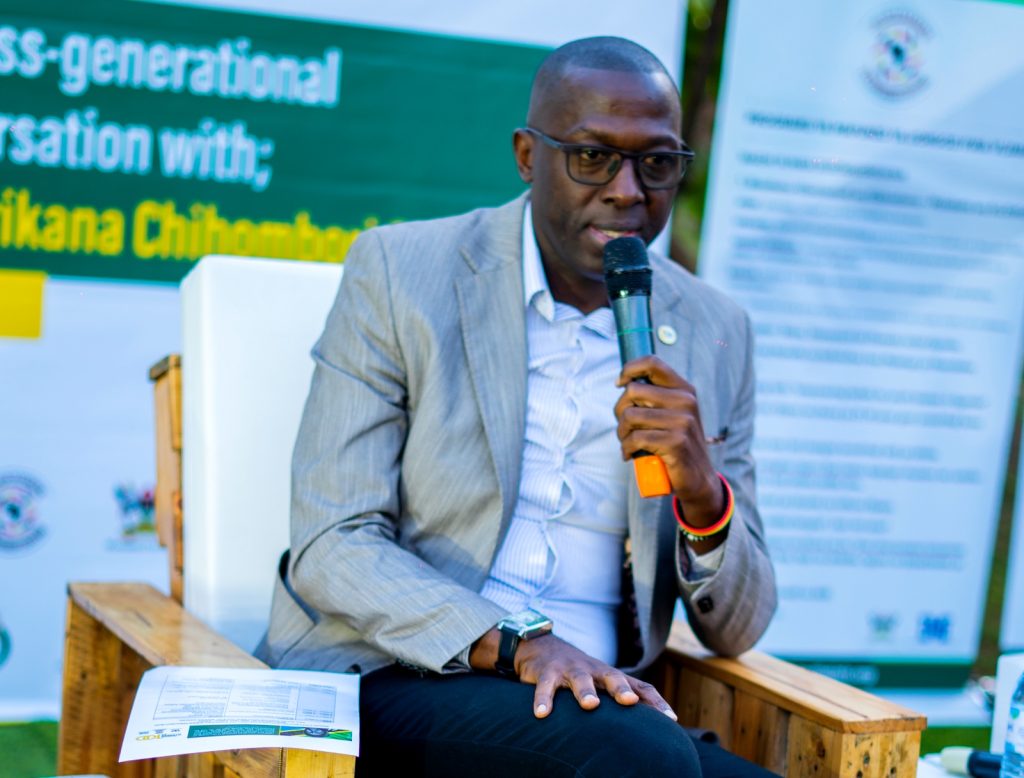
Mr. Tumusiime stated that gathering to talk and reflect on our culture, identity and effective development is a great move and if we need to store and have a strong foundation to tag along and not behind, there is need to move side by side with the women in Africa. In his view, when it comes to Pan African affairs, women have proved that they can stand to be so loyal more than men when it comes to building homes and nations. “Many women especially in West Africa fought the colonialists, some of whom are in history books and never spoken about, but they set a foundation for many of those countries that were liberated.”
In Africa, Mr. Tumusiime noted that culture was the only fortress that had remained. According to Mr. Tumusiime if we start with identifying ourselves as Africans who are brothers and sisters and agree that identity with one another is what’s going to be our next fortress, then that will be the best.” He noted with concern that “some parents do not even wish to give their children African names, but foreign names with hardly a meaning, yet for a long time we have preserved our culture through our names and our stories; it’s now high time we returned to our roots.
Focusing on being young, African and Free, Mr. Jacob Eyeru, the Chair of Uganda National Youth Council said there is more freedom among many young Africans today than ever before. There has never been a connected generation in Africa as they are. They have a privilege of the Internet where they could ably communicate to fellow youth near and far, but the choices of what they speak about, the agenda and direction of the conversations they hold are what still need to be worked on. In that regard, he urged his fellow young Africans to use their freedom to interact on the questions of the generational consequences for Africa.
“As young African leaders, let us challenge ourselves to be a driving force to unite us to the Africa we want. When we talk about agenda 2030, 2063, it is not for our fathers, but for us and our children. We are the future leaders of Africa, not our fathers. So, shall we be speaking of the same challenges that our fore fathers spoke about? Mr. Eyeru remarked that “we need to carry on our own generation in our youthfulness to make Africa a better continent for us and our children.”
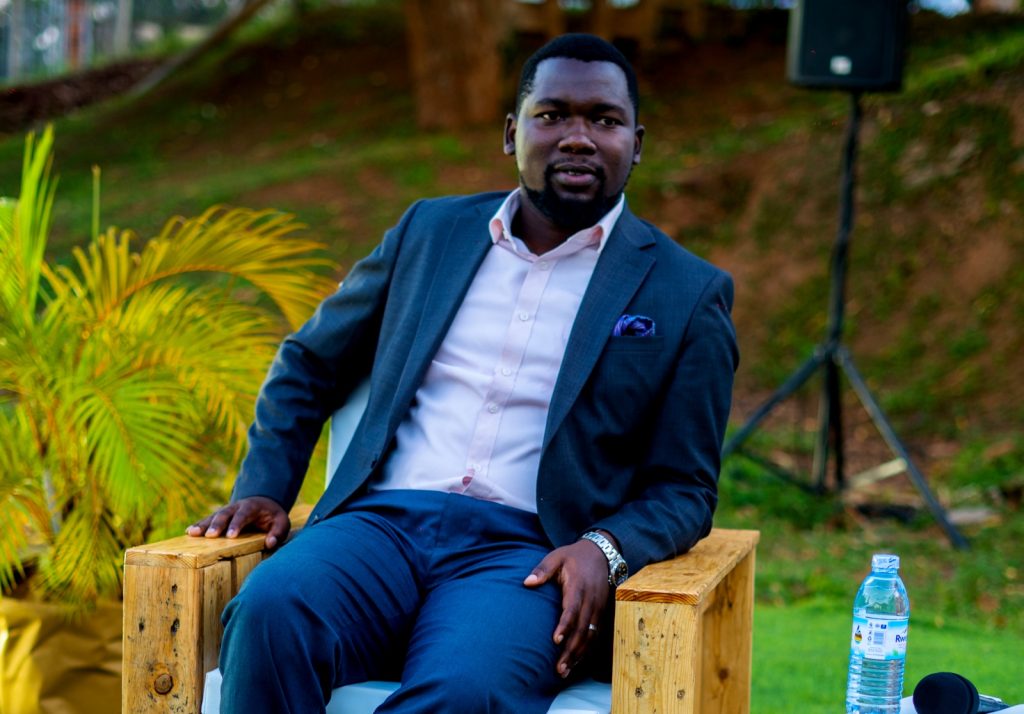
He added that young Africans can build a generational consensus to devote sometime away from their economic needs to the needs of the future of Africa in the global space. The globalisation agenda did not start today, it started way back, but is only to the effect that opportunities are brought to the countries that are already ahead of others. That is the globalisation journey and the kind of world of liberalisation that Mwalimu Julius Nyerere spoke about.
Contemplating on the struggles their fore fathers and mothers passed through and the contribution they made in a time when there was no technology like today, Mr. Eyeru felt his generation has not made good use of the freedom and opportunities they have to full capacity in creating a better Africa. He then wondered what the young people now use their freedom for and how they would take Africa to a position where it has to be. He said, that is where his interest has been in the entire term of his leadership.
“Our generation is not organising around the freedom that we have. Everything from around 1960 to about 1980 in Africa was a struggle and people were organising without telephones, internet and other technologies. When Uganda was getting its independence in 1962, the country had less than 100 graduates at University level, but these graduates were talking about what was happening in Apartheid South Africa and how Uganda must contribute. That’s Pan Africanism. Mr. Eyeru concluded that we should also emulate that in our generation, and the freedom to interact we have as young Africans must mean something for the future of our continent.”
H.E. Mariat Namiiro, the Vice Guild President of the 89th Students’ Guild at Makerere University and a vibrant Pan-Africanist revealed that the youth in Africa still lacked the sense of feeling the sense of Africanism in them. She disclosed the need to learn from those leaders who had gone through it and understood Pan Africanism as well as the need for African economic liberation. She said that Africans should start by accepting who they are.
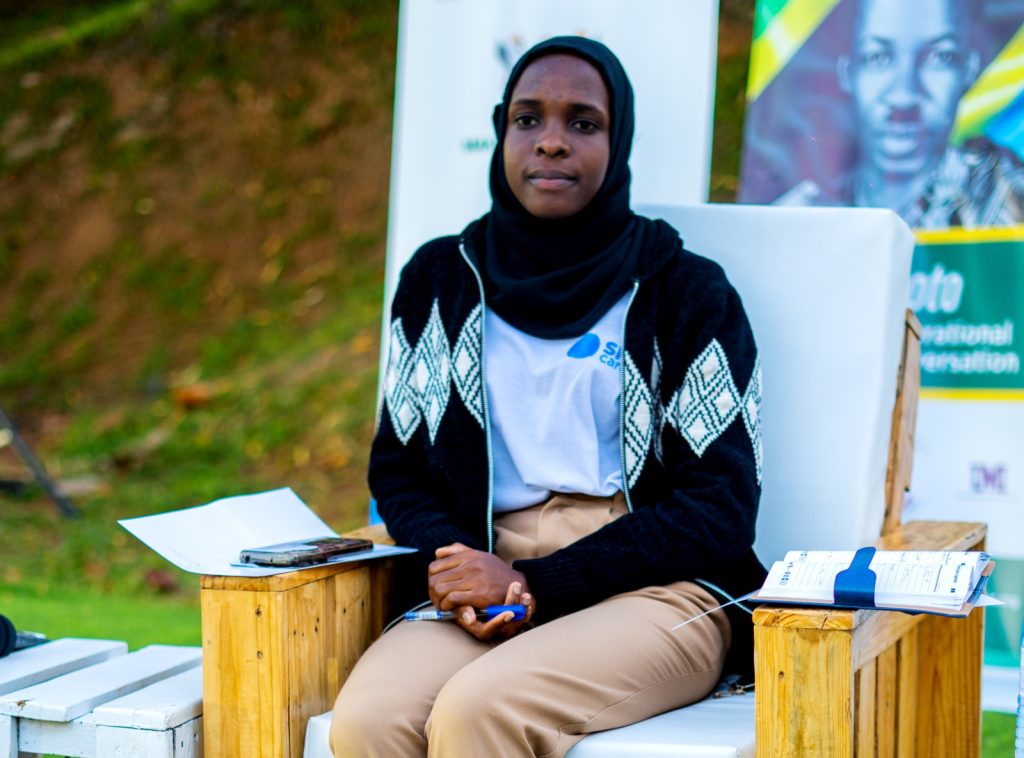
H.E. Namiiro said, “as a young leader, I can stand up for what I believe is right. As an African, I can stand up for Africa because I believe that Africans are the best. In this world of trying to grapple with economic and environment changes and resource challenges, I do believe that we as young leaders have a great role to play. We have a lot to do to ensure sustainable practices that can develop and spread within Africa.”
The Vice Guild President noted that the youth shouldn’t wait to be given authority and leadership positions to feel that they can change Africa to what we want it to be. She thus called upon fellow youth leaders to embrace the mantle of everyday leadership with determination and hope together. This was because she believed that they could create a world where self-sustenance and economic liberation are not just an aspiration to them, but a reality in Africa like how our fore fathers and mothers wanted it to be.
According to Hon. Moses Jok Aluong, an international student from South Sudan and the Minister for International Students in the 89th Students’ Guild at Makerere University, the African youth can leverage their identity with other Africans to better position the continent. Having come from a country with a diversity of identities, 64 tribes in total, he realised that the way they make use of that opportunity as Africans is not the best. They use that diversity of identity to foster vices such as corruption, nepotism and favoritism which he thinks should change.
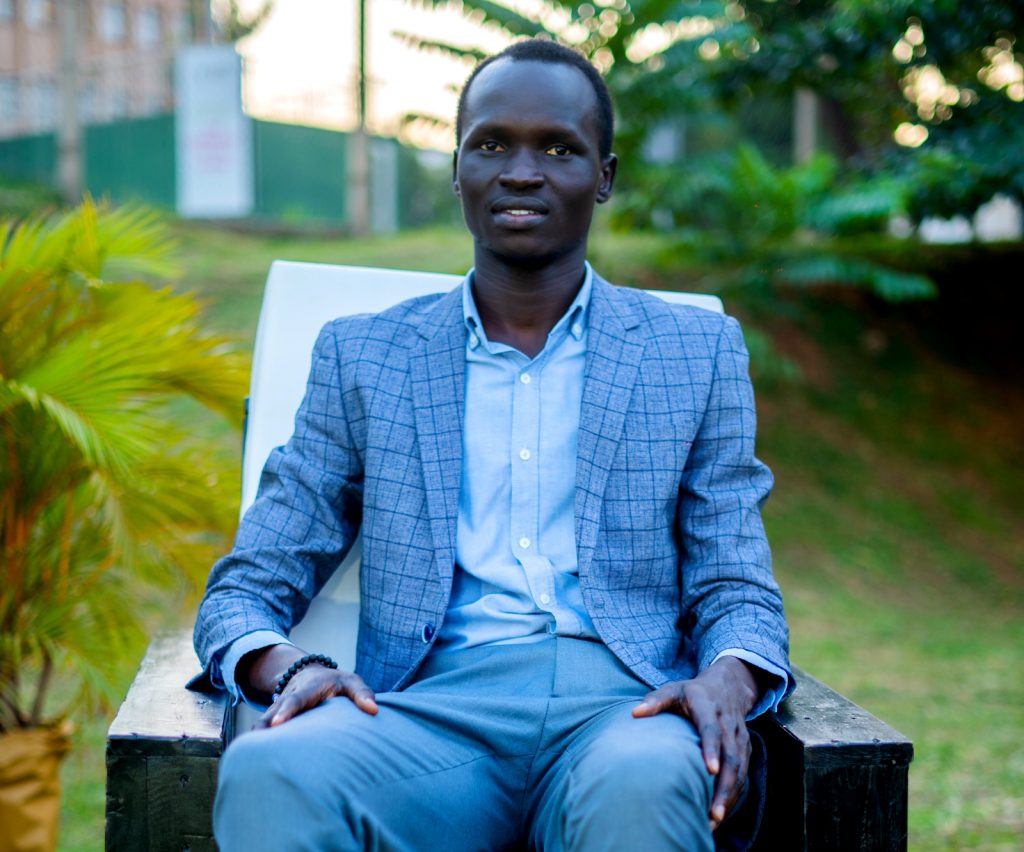
Hon. Jok said that the African youth should understand that despite the diversity of identity, they have a common background. In his opinion, they can use their history and identify to contribute to self-sustenance in Africa and to rebrand and reshape the narrative of the African Youth, “If I belong to one ethnicity, it does not mean that we are different. It should be more of how we can make good use of this, having come from different backgrounds to better tell our common story as Africans. I believe we as the youth leaders can change that.”
He advised that the youth should embrace and leverage on the available opportunities namely the Internet and other technologies to constructively position themselves. He stressed the point that the youths from other spheres of the world such as China who are making research every day to come up with new inventions are not more intelligent than them. He implored his fellow youth to make use of what they have to better reposition Africa than going with the flow of how the West defines us.
“We have to better position ourselves to make good use of available opportunities to retell our story. We can also emulate countries that have made it yet they were once in the same position with us. These people decided to redefine themselves. We can redefine ourselves by making use of what we have because we have it all. What we need is to put it to good use,” said Hon. Jok.
Wrapping up the Fireside conversation (Ekyooto), the JNLC Executive Director, Dr. Nansozi Muwanga thanked H.E. Ambassador Arikana Chihombori Quao for the wonderful submission to the youth and young leaders as well as her exemplary role as a Pan Africanist. She also commended Makerere University for providing the Centre with the physical space as well as the Uganda Management Institute (UMI) for their consistent support and partnership. Dr. Muwanga equally thanked the young leaders present for their active participation in the Ekyooto – the Fireside conversation.
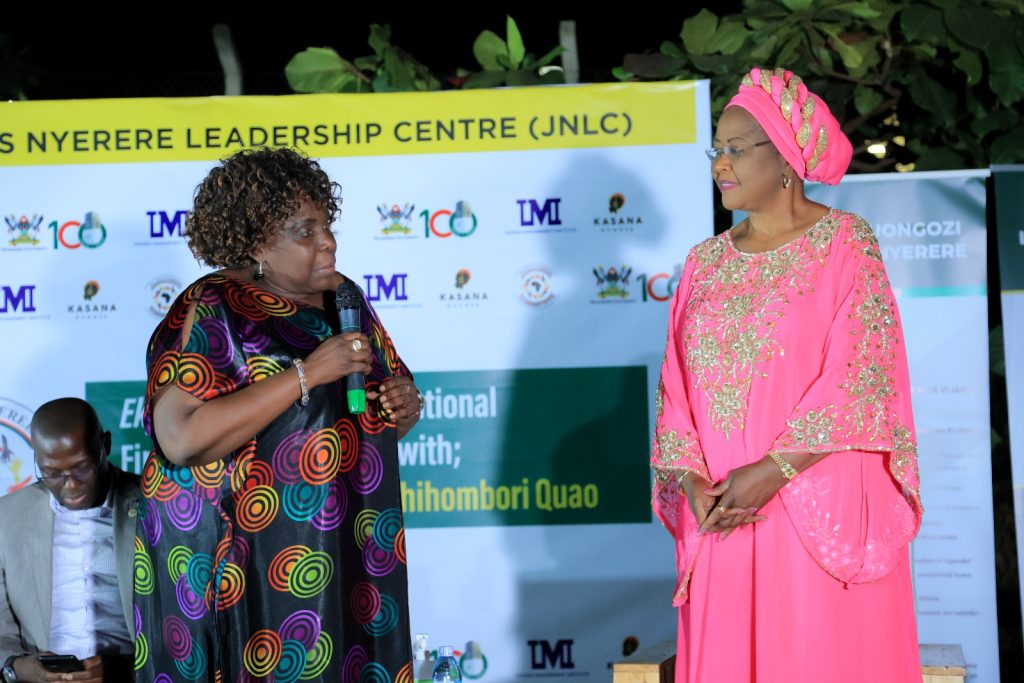
Ambassador Arikana Chihombori expressed her sincere gratitude for the invitation to Makerere University to speak to the young bright minds and the future African leaders. She believed that the cross-generational conversation presented her with a platform to fulfill her responsibility as an elder by teaching the youth and young leaders the truth.
The Ambassador gifted JNLC with copies of one of her famous books titled “Africa 101: The Wake Up Call.” The book is about the “hunters” and the “hunted.” The hunters are Africa’s exploiters, slavers, colonizers, and neo-colonisers, and the hunted are the African people who have survived against severe odds. In this book, Ambassador Arikana confirms that the hunt is still ongoing and calls on Africans and people of African descent all over the world to rise up in defense of Africa-our beloved continent.
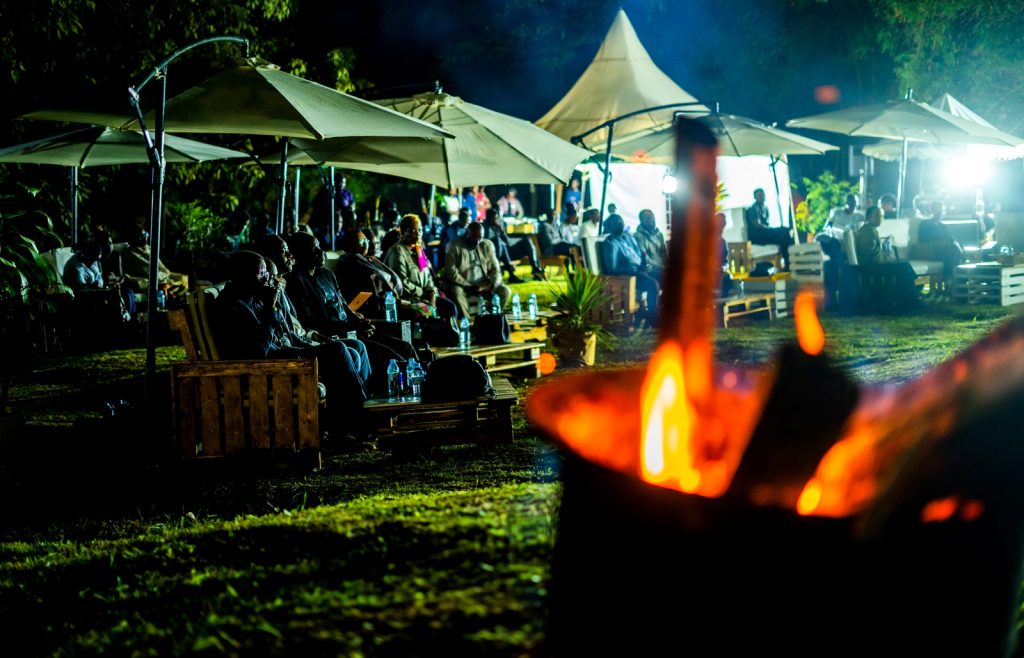
The front cover states, “Wake up from the slumber of 400 years, free yourself from the mental shackles of colonialisation and slavery, black lives matter, I can’t breathe, get off my neck.” This book contains the naked truth that our children must read. Every chapter is a subject matter. It will make you think deep about what is really going on in Africa. Ambassador Arikana said: “So, this is my gift to the Julius Nyerere Leadership Centre (JNLC).”
You may like
-


Simplicity, Service & Scholarship: Hallmarks of Professor Livingstone Luboobi’s Legacy
-


EfD-Mak Holds 2nd Advisory Board Meeting: Charts Path for Growth
-


Celebrating the Life of Prof. Livingstone Sserwadda Luboobi
-


Fare Thee Well Prof. Luboobi
-
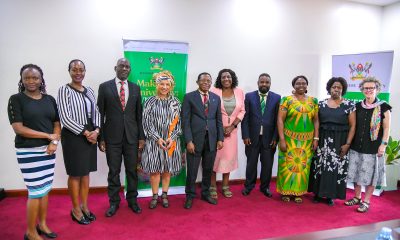

Mak, HERS-EA Discuss Nurturing More Women Leaders
-
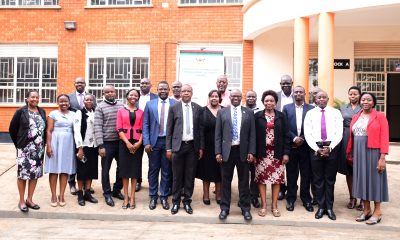

School of Business Conducts Strategic Leadership Training for Makerere University Managers
General
Simplicity, Service & Scholarship: Hallmarks of Professor Livingstone Luboobi’s Legacy
Published
10 hours agoon
July 18, 2025By
Eve Nakyanzi
On Wednesday 16th July 2025, Makerere University lost one of its most cherished sons, Professor Livingstone Sserwadda Luboobi. Described as a mathematician, academic leader, and humble servant, Professor Luboobi devoted more than five decades to the university, rising through the ranks to become Vice Chancellor, and leaving a legacy defined by simplicity, service, and scholarship.
Born to Lameka Serwadda and Sanyu Serwadda on 25th December 1944 in Mitondo, Kalisizo, Kyotera District, Professor Luboobi’s academic career begun as a third-year student at Makerere and continued with unwavering loyalty until his passing. His life’s work reflected not only a commitment to mathematics but also nurturing generations of scholars and leaders across Uganda and beyond.
A funeral service was held in his honour at St. Francis Chapel, Makerere University on 18th July 2025. It was a moment of solemn remembrance and heartfelt tribute. Rev. Canon Dr. John Senyonyi delivered the sermon titled “Only God Knows,” reminding mourners of the mystery and grace of life’s journey. Rev. Canon Geoffrey Byarugaba represented the Kampala Diocese at the service, while former St. Francis Chaplain, Rev. Dr. Canon Johnson Ebong thanked Professor Luboobi for spearheading the Chapel’s expansion. Friends, colleagues, and family members filled the chapel, joined in mourning but also in gratitude for a life that had deeply touched theirs.

Mrs. Lorna Magara, Chairperson of the University Council, spoke movingly about Professor Luboobi’s faithfulness, likening his life to the biblical call in Mark 10:43, “Whoever wants to become great among you must be your servant.”
In his condolence message, the Vice Chancellor, Professor Barnabas Nawangwe, hailed Professor Luboobi as a visionary leader whose legacy is deeply woven into Makerere’s identity as a research-led institution. He credited Professor Luboobi with laying the groundwork for a culture of inquiry—championing graduate programmes, encouraging doctoral training, and fostering international collaborations that strengthened the university’s research profile. “He believed in building systems, not just structures,” noting that many of Makerere’s current research policies stem from his leadership. Even in retirement, Professor Luboobi remained a source of wisdom and guidance, quietly shaping the future of the university he so deeply loved.
Speaker after speaker painted a portrait of a man who led not by pomp, but by quiet strength and deep conviction. The Principal, Professor Winston Tumps Ireeta, speaking on behalf of the College of Natural Sciences (CoNAS), described Professor Luboobi as a foundational figure whose influence is deeply etched in the structures and spirit of the college. He spoke with emotion about Luboobi’s unwavering commitment to academic integrity and his belief in the power of mentorship.

“He was not just a mathematician,” Professor Ireeta said, “he was a visionary who understood the soul of the university. Even in retirement, he remained an advisor, a guide, and a quiet force of wisdom.” He concluded by saying that the college would continue to draw from his example as it navigates the future of science and innovation in Uganda.
Professor Luboobi’s illustrious career at Makerere University included serving as Head, Department of Mathematics from 1990 to 1991. The current Head of Department, Dr. Ismail Mirumbe remembered him as a pillar in the teaching and development of mathematics in Uganda
Professor John Mango, who served as Head, Department of Mathematics during Professor Luboobi’s term as Vice Chancellor from 2004 to 2009 described him as a towering figure of integrity and principle, someone who not only upheld the highest standards of academic conduct but insisted that others around him do the same. “He was a pillar in the department,” Prof. Mango remarked, “and his moral compass was unwavering.”

He recalled instances where Professor Luboobi made firm decisions, including terminating contracts when integrity was compromised, setting a tone that shaped the department’s reputation for honesty and excellence. Even as Vice Chancellor, he remained deeply involved in the department’s affairs, teaching, supervising students, all the while handling top administrative duties punctually. Prof. Mango spoke with great admiration of a man who led by example, mentored many, and whose contributions to mathematics education, research, and policy-making continue to shape the future of the discipline in Uganda and beyond.
According to an article from 1990 written by Dr. Vincent Ssembatya and Andrew Vince at the University of Florida, the Uganda Mathematical Society (UMS), which was formally established on 25th November, 1972 has since inception enjoyed major support from Makerere University and Kyambogo University in terms of infrastructure and leadership. Professor Paul Mugambi, who was also present at Professor Luboobi’s funeral service was elected first president of the UMS. Dr. Saul Nsubuga from the Department of Mathematics represented UMS at the service, honouring Professor Luboobi’s pioneering role in the discipline.
The service also featured tributes from close friends and family. Loved ones shared stories of a man who remained grounded no matter how high he rose, a man who valued relationships and walked closely with his faith. His children and grandchildren remembered him as a father who was ever-present, a listener, and a source of steady guidance.

Professor Daniel Kibuule, son of the late Professor Luboobi and Dean, Faculty of Health Sciences at Busitema University, delivered a deeply personal tribute that painted a full portrait of his father’s life, values, and final days. He expressed gratitude to the University leadership, family, friends, and medical professionals who stood with them during a challenging period. He particularly thanked his siblings, Dr. David Kimera and Dr. Irene Nakiyimba for their unwavering role in caring for Professor Luboobi through illness.
He spoke of a man who, despite great academic accolades, remained deeply humble and committed to discipline, simplicity, and faith. From instilling punctuality and responsibility to ensuring his children charted their own paths, none bearing his surname “Luboobi”, Prof. Luboobi was intentional in every lesson he passed on. Kibuule recalled his father’s insistence on being at home even in his final moments, his strong connection to Christ, and his quiet strength despite his failing health.
Former students and mentees echoed the same sentiments, of a teacher who was generous with his time and invested deeply in others’ growth. The community that gathered was not only there to grieve but to celebrate the quiet legacy of a man whose example continues to live on.
Among the mourners were public figures and leaders, including Hon. Abed Bwanika, Member of Parliament for Kimanya-Kabonera, Hon. Nyombi Thembo, the Executive Director Uganda Communications Commission, and Hon. Dr. Ham-Mukasa Mulira, former Minister of ICT, among others.
In his passing, Makerere University has lost a pillar, but his life reminds us that greatness lies in consistency, in humility, and in service to others. Professor Luboobi’s memory will continue to live on in the minds he shaped, the systems he built, and the values he embodied. He ran his race with grace.
The Writer is a Volunteer in the Public Relations Office, Makerere University
Please click the embedded video below to view the service livestream
General
Public University Legal and Accounting Officers Trained on Governance and Compliance
Published
2 days agoon
July 17, 2025By
Eve Nakyanzi
Legal and accounting officers from public universities across Uganda have convened, for a high-level training workshop organized by Makerere University. The three-day training, taking place from July 16th to 18th, 2025, is aimed at strengthening legal frameworks, improving institutional governance, and ensuring compliance with public finance and procurement laws within higher education institutions.
Ms. Lorna Magara, Chairperson of the Makerere University Council and Guest of Honour at the opening session, commended the initiative as timely and necessary. She addressed the growing backlog of court cases affecting Makerere and other public universities and outlined measures already taken to mitigate legal risks. These include the establishment of a Legal Rules and Privileges Committee and the Directorate of Legal Affairs, part of a broader strategy to improve legal compliance and foster good governance.
Representing the Vice Chancellor, Prof. Winston Tumps – Ag. Deputy Vice Chancellor (Finance and Administration), described the training as both strategic and practical. “It is imperative that we learn from each other, especially in how we handle employee litigation and institutional legal risks,” he remarked. He added that the program is designed to promote experience-sharing across universities and enhance collective institutional growth.

In his address, Mr. Yusuf Kiranda, University Secretary at Makerere University, emphasized the urgent need for robust legal oversight and more effective case management mechanisms within public universities.
The training featured a keynote address by the Attorney General of Uganda, Hon. Kiryowa Kiwanuka, who provided critical insights into legal expectations for public institutions. He warned that failure to heed legal advice could result in personal liability for accounting officers, citing a precedent involving the Uganda Cancer Institute. “Universities must consult the Attorney General’s chambers before entering into major contractual obligations,” he advised, urging legal officers to document decisions meticulously as proper record-keeping forms the first line of defense in legal disputes.

Hon. Kiwanuka further discussed the government’s ongoing efforts to recentralize legal services to ensure alignment with the Attorney General’s office. He cautioned in-house counsel against becoming overly entangled in decision-making processes, stressing the need for objectivity. Other key issues he addressed included contract approvals, misuse of Memoranda of Understanding (MoUs), and lapses in procurement processes, particularly at the close of financial years.
Participants also benefited from insights by Hon. Justice Musa Ssekaana of the Court of Appeal, who offered an in-depth analysis of judicial review and its significance in promoting lawful, transparent university governance. He called on university legal officers to act with clarity, timeliness, and accountability.
Lady Justice Joyce Kavuma, Judge of the High Court, delivered a comprehensive presentation on dispute and claim management involving public universities. She addressed emerging trends in civil litigation, emphasizing the importance of due process, transparency, and clear communication in resolving employment, student, and contractual disputes. Drawing on real case examples, she urged institutions to strengthen internal systems, embrace participatory governance, and adopt regional best practices to minimize litigation and protect institutional reputation.

The training reflects a shared commitment among public universities to build a more accountable, legally sound, and strategically aligned higher education system in Uganda. Through peer learning and collaboration, participating institutions aim to reduce litigation, enhance institutional autonomy, and uphold the rule of law.
Participating universities include Makerere University, Kyambogo University, Mbarara University of Science and Technology, Busitema University, Mountains of the Moon University, and Lira University.
The training concludes on July 18th 2025, with sessions focusing on employment dispute management in public universities and the implications of recent PPDA Appeals Tribunal decisions on procurement and disposal practices within public entities.
General
Celebrating the Life of Prof. Livingstone Sserwadda Luboobi
Published
2 days agoon
July 17, 2025By
Mak Editor
A Visionary Leader, Seasoned Mathematician, & Humble Academician
It is with profound love and respect that we celebrate the life of Prof. Livingstone Sserwadda Luboobi, a distinguished scholar, transformative leader, and beloved Vice Chancellor Emeritus of Makerere University. His legacy is woven in the fabric of African higher education, marked by intellectual brilliance, unwavering commitment to academic excellence, and a life of selfless service.
A Life of Purpose and Vision
Prof. Luboobi was more than a mathematician. He was a visionary, whose work transcended equations and research papers. Serving as Vice Chancellor from 2004 to 2009, he led Makerere University through a critical period of growth and transformation. Under his guidance, the university expanded its reach, strengthened its academic rigor, and embraced innovation and reform. His calm demeanour and principled decision-making earned the admiration of students, faculty, and peers alike.
Prof. Luboobi was deeply committed to nurturing talent and fostering intellectual curiosity, leaving an indelible mark on the institution’s culture and future direction.
Beyond Uganda, Prof. Luboobi’s influence resonated across the global academic community. He was a passionate advocate for the transformative power of science and education, often speaking at international forums and collaborating on research that bridged continents and disciplines. His work helped elevate the profile of African scholarship on the world stage.
His legacy endures not only in the impressive body of work he left behind but also in the countless lives he touched – students, educators, and leaders who continue to draw inspiration from him.
Academic and Leadership Journey at Makerere University
An illustrious alumnus of Makerere University, Prof. Luboobi graduated with First Class Honours in Mathematics, laying the foundation for an extraordinary academic journey. He pursued further studies at the University of Toronto (MSc in Operations Research, 1971-72) and the University of Adelaide (PhD in Biomathematics, 1978–80). His scholarly journey spanned prestigious institutions worldwide, including UCLA, the University of Bergen, and the University of Dar es Salaam, establishing him as a scholar of global repute and a proud ambassador of African intellectualism.
Prof. Luboobi’s service to Makerere begun in 1970 as a Special Assistant-remarkably, while still an undergraduate, rising through the ranks to full Professor in 1997. He served as Head of Department, Dean of the Faculty of Science (1994–2001), and later became the university’s first elected Vice Chancellor. His tenure brought new energy to institutional leadership, characterized by transparency, inclusivity, strategic direction and accountability.
Strategic Reforms and Institutional Impact
A true architect of transformation, Prof. Luboobi chaired the development of Makerere’s first locally-conceived Strategic Plan (1990–91). He was instrumental in securing a UGX30 billion grant from NORAD in 1999, which revitalized key academic areas such as computing, gender studies, and food science. He co-founded the Makerere University Private Sector Forum, bridging the gap between academia and industry, and strengthening alumni engagement and resource mobilization.
Pioneering Biomathematics and Mentorship
As one of Africa’s pioneering biomathematicians, Prof. Luboobi introduced mathematical modeling to tackle real-world problems in epidemiology, ecology, and operations research. His scholarly contributions – over 150 publications – reflect the depth and breadth of his research. Yet, perhaps his most lasting impact lies in mentorship: he supervised more than 35 PhD and over 50 MSc students, including Makerere’s first female PhD graduate in Mathematics, nurturing a generation of scholars and leaders.
Prof. Luboobi’s Contribution to the Internationalization of Makerere University
Prof. Luboobi played a pivotal role in advancing the international profile of Makerere University. Demonstrating remarkable personal commitment, he utilized his own resources to support the establishment of the University’s International Office. This strategic initiative laid the foundation for a more structured and effective engagement with global academic institutions, development partners, and international students. As a result, Makerere University significantly enhanced its global footprint, forming numerous international collaborations and attracting increased academic and research opportunities from abroad.
In addition to his contributions to internationalization, Prof. Luboobi was also instrumental in revitalizing the University’s Public Relations Unit. Under his guidance, the unit adopted more proactive and professional communication strategies, which greatly improved the institution’s public image. This, in turn, fostered greater public trust and strengthened the university’s reputation both locally and internationally. His visionary leadership in these areas has had a lasting impact, positioning Makerere University as a leading institution in East Africa and beyond.
Global Recognition and Enduring Legacy
Prof. Luboobi’s contributions earned him widespread recognition. In 2008, the University of Bergen awarded him an Honorary Doctorate for his role in internationalizing academia. Makerere University honoured him with a Lifetime Achievement Award in 2013, and the Government of Uganda conferred upon him a National Gold Medal for his unwavering service to education and national development.
Even after retirement, Prof. Luboobi remained an active contributor to academic life-lecturing, supervising, and advising the university.
A Lasting Light in African Academia
Prof. Livingstone Sserwadda Luboobi’s life was a model of scholarship anchored in service, leadership tempered with humility, and an unshakable belief in the power of education. He leaves behind a vibrant academic legacy and a trail of inspired minds. His contributions will continue to shape Makerere University, Uganda, and the global academic community for generations to come.
We extend our heartfelt condolences to his family, colleagues, and the entire Makerere University community during this difficult time.
May his soul rest in eternal peace.
Trending
-

 General2 weeks ago
General2 weeks agoRe-advert: Admission to Undergraduate Programmes 2025/2026
-

 General1 week ago
General1 week agoRe-Advert for Applications for Diploma and Certificate Training
-

 General5 days ago
General5 days agoMakerere University Fees Waiver for 40 First Year Female Students 2025/2026
-

 General2 weeks ago
General2 weeks agoPress Statement on Ranking
-

 Health1 week ago
Health1 week agoCall for Applications: Responsible Conduct of Research (RCR) Training Course
